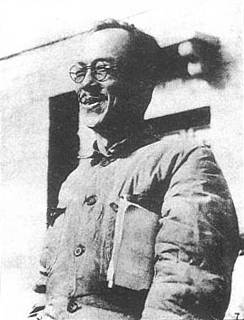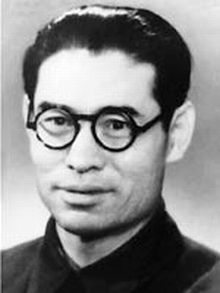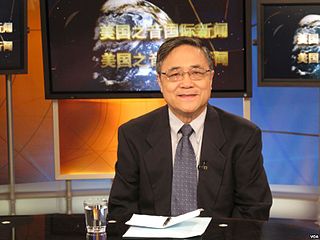
The Cultural Revolution, formally the Great Proletarian Cultural Revolution, was a violent sociopolitical purge movement in China from 1966 until Mao Zedong's death in 1976. Launched by Mao Zedong, Chairman of the Chinese Communist Party (CCP) and founder of the People's Republic of China (PRC), its stated goal was to preserve Chinese communism by purging remnants of capitalist and traditional elements from Chinese society, and to re-impose Mao Zedong Thought as the dominant ideology in the PRC. The Revolution marked Mao's return to the central position of power in China after a period of less radical leadership to recover from the failures of the Great Leap Forward, which contributed to the Great Chinese Famine only five years prior.

The Gang of Four was a political faction composed of four Chinese Communist Party officials. They came to prominence during the Cultural Revolution (1966–1976) and were later charged with a series of treasonous crimes. The gang's leading figure was Jiang Qing. The other members were Zhang Chunqiao, Yao Wenyuan, and Wang Hongwen.

Zhou Enlai, Wade-Giles transliteration Chou En-lai, was the first Premier of the People's Republic of China. From October 1949 until his death in January 1976, Zhou was China's head of government. Zhou served under Chairman Mao Zedong and helped the Communist Party rise to power, later helping consolidate its control, form its foreign policy, and develop the Chinese economy.

The Long March was a military retreat undertaken by the Red Army of the Communist Party of China, the forerunner of the People's Liberation Army, to evade the pursuit of the Kuomintang army. There was not just one Long March, but a series of marches, as various Communist armies in the south escaped to the north and west. The best known is the march from Jiangxi province which began in October 1934 and ended in Yan'an, Shaanxi province in October 1935. The First Front Army of the Chinese Soviet Republic, led by an inexperienced military commission, was on the brink of annihilation by Generalissimo Chiang Kai-shek's troops in their stronghold in Jiangxi province. The Communists, under the eventual command of Mao Zedong and Zhou Enlai, escaped in a circling retreat to the west and north, which reportedly traversed over 9,000 kilometres (5,600 mi) over 370 days. The route passed through some of the most difficult terrain of western China by traveling west, then north, to Shaanxi.

Hua Guofeng was a Chinese politician who served as Chairman of the Communist Party of China and Premier of the People's Republic of China. The designated successor of Mao Zedong, Hua held the top offices of the government, party, and the military after the deaths of Mao and Premier Zhou Enlai, but was gradually forced out of supreme power by a coalition of party leaders between December 1978 and June 1981, and subsequently he retreated from the political limelight, though still remaining a member of the Central Committee until 2002.

The Tiananmen Incident was a mass gathering and protest that took place on 5 April 1976, at Tiananmen Square in Beijing, China. The incident occurred on the traditional day of mourning, the Qingming Festival, after the Nanjing Incident, and was triggered by the death of Premier Zhou Enlai earlier that year. Some people strongly disapproved of the removal of the displays of mourning, and began gathering in the Square to protest against the central authorities, then largely under the auspices of the Gang of Four, who ordered the Square to be cleared.

Kang Sheng was a Communist Party of China (CPC) official best known for having overseen the work of the CPC's internal security and intelligence apparatus during the early 1940s and again at the height of the Cultural Revolution in the late 1960s and early 1970s. A member of the CPC from the early 1920s, he spent time in Moscow during the early 1930s, where he learned the methods of the NKVD and became a supporter of Wang Ming for leadership of the CPC. After returning to China in the late 1930s, Kang Sheng switched his allegiance to Mao Zedong and became a close associate of Mao during the Anti-Japanese War, the Chinese Civil War and after. He remained at or near the pinnacle of power in the People's Republic of China from its establishment in 1949 until his death in 1975. After the death of Chairman Mao and the subsequent arrest of the Gang of Four, Kang Sheng was accused of sharing responsibility with the Gang for the excesses of the Cultural Revolution and in 1980 he was expelled posthumously from the CPC.

Wang Ming was a senior leader of the early Communist Party of China (CPC) and the mastermind of the famous 28 Bolsheviks group. Wang was also a major political rival of Mao Zedong during the 1930s, opposing what he saw as Mao's nationalist deviation from the Comintern and orthodox Marxist–Leninist lines. According to Mao on the other hand, Wang epitomized the intellectualism and foreign dogmatism Mao criticized in his essays "On Practice" and "On Contradiction". The competition between Wang and Mao was a reflection of the power struggle between the Soviet Union, through the vehicle of the Comintern, and the CPC to control both the direction and future of the Chinese revolution.

Gao Gang was a Communist Party of China (CPC) leader during the Chinese Civil War and the early years of the People's Republic of China (PRC), before becoming the victim of the first major purge within the CPC since before 1949. The events surrounding Gao's purge, the so-called "Gao Gang Affair", are still the subject of debate: a limited amount of research has been done on the topic, partly due to the relatively small amount of information available.

The Yan'an Rectification Movement, also known as Zhengfeng or Cheng Feng, was the first ideological mass movement initiated by the Chinese Communist Party (CCP), going from 1942 to 1945. The movement took place at the communist base at Yan'an, a remote and isolated mountainous area in northern Shaanxi, after the communists' Long March. Though it was during the Second Sino-Japanese War, the CCP was experiencing a time of relative peace when they could focus on internal affairs.
Lucian W. Pye was an American political scientist, sinologist and comparative politics expert considered one of the leading China scholars in the United States. Educated at Carleton College and Yale University, Pye chose to focus on the characteristics of specific cultures in forming theories of political development of modernization of Third World nations, rather than seeking universal and overarching theories like most political scientists. As a result, he became regarded as one of the foremost contemporary practitioners and proponents of the concept of political culture and political psychology. Pye was a teacher at the Massachusetts Institute of Technology for 35 years and served on several Asia-related research and policy organizations. He wrote or edited books and served as advisor to Democratic presidential candidates, including John F. Kennedy. Pye died of pneumonia at age 86.
Wang Li, born Wang Guangbin was a Chinese Communist propagandist and prominent member of the Cultural Revolution Group, in charge of overseeing the Cultural Revolution movement of Mao Zedong. Wang joined the Communist movement in his youth and became a specialist in theory and propaganda work. He was one of the leading figures of party propaganda at the outset of the Cultural Revolution, and contributed to the synthesis of Mao's theory of "continuous revolution."

Ji Chaozhu was a Chinese diplomat who held a number of important positions in the Ministry of Foreign Affairs of the People's Republic of China (PRC), most notably as English interpreter for Chairman Mao Zedong, Premier Zhou Enlai and Deng Xiaoping; later as Ambassador to the Court of St. James's ; and lastly as an Under-secretary General of the United Nations, a post from which he retired in 1996. He played a central role in the talks leading up to and during President Richard M. Nixon's historic 1972 visit to China.

Gao Wenqian is the Senior Policy Advisor at Human Rights in China.

Lin Boqu was a Chinese politician and poet. An early supporter of Sun Yat-sen and member of the Tongmenghui, as well as a later participant in the Nanchang Uprising and the Long March, Lin came to be seen as one of the elder statesmen of the Communist Party of China.
Events in the year 1952 in the People's Republic of China.
Born Red: A Chronicle of the Cultural Revolution is an autobiography of Gao Yuan and his recollection of experiences during the Cultural Revolution in China. Stanford University Press is the publisher. The foreword was written by William Joseph. At the time Gao Yuan was a post-graduate student at Stanford University.

Chen Jian is Hu Shih Professor of History and China-US Relations emeritus at Cornell University. His specialties include modern Chinese history, history of Chinese-American relations, and Cold War international history. He is also Zijiang Distinguished Visiting Professor at East China Normal University and Distinguished Global Network Professor of History at New York University Shanghai.

The Founding Ceremony of the Nation is a 1953 oil painting by Chinese artist Dong Xiwen. It depicts Chairman Mao Zedong and other Communist officials inaugurating the People's Republic of China at Tiananmen Square on October 1, 1949. A prominent example of socialist realism, it is one of the most celebrated works of official Chinese art. The painting was repeatedly revised, and a replica painting made to accommodate further changes, as the leaders it depicted fell from power and later were rehabilitated.
The 10th National Congress of the Chinese Communist Party was a significant Communist Party Congress in China following the fall of Lin Biao and the continuation of the Cultural Revolution. It profoundly elected the 10th Central Committee of the Chinese Communist Party.















